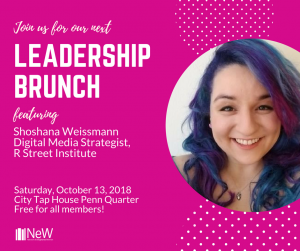Join us in Washington, DC on Saturday, October 13
Register today for our Fall Leadership Brunch! Join us at City Tap House Penn Quarter in Washington, DC on Saturday, October 13 for a discussion and brunch with Shoshana Weissmann, Digital Media Strategist at R Street Institute. Her talk is titled: All the Over-Regulated Ladies: How Regulations Hurt Women.
today for our Fall Leadership Brunch! Join us at City Tap House Penn Quarter in Washington, DC on Saturday, October 13 for a discussion and brunch with Shoshana Weissmann, Digital Media Strategist at R Street Institute. Her talk is titled: All the Over-Regulated Ladies: How Regulations Hurt Women.
In her role as a digital media specialist with the R Street Institute, Shoshana, manages the institute’s social media and email marketing, in addition to contributing graphics and video skills. She also works on occupational licensing reform and other policy issues. She has written for various publications, including The Wall Street Journal and USA Today.
Shoshana joined R Street in June 2017, having most recently managed digital communications for Opportunity Lives, a group that highlighted positive stories and policy solutions. Before that, she managed social media and wrote for The Weekly Standard.
Earlier in her career, she managed digital communications for America Rising PAC, where her strategy was highlighted in a piece that appeared in The New York Times. Shoshana has been featured in MavPAC’s “Future 40” list in 2018, Red Alert Politics’ “30 Under 30” list in 2013, and, in 2012, was the youngest person on the District of Columbia Republican Committee’s “35 Under 35” list.
Check out our interview with Shoshana to get a sneak peek of the upcoming brunch:
What advice do you have for young conservative women today?
Find the kind of work you love doing – finance, policy, communications – and the kind of place you want to do it – a campaign, a think tank, a political committee. Doing what you love at a place you love will make you happy. Don’t seek glamour in your work, but seek out joy and meaning. Too much of politics is the desire to be “THE young conservative woman,” but there are so many of us, which is a good thing! It’s better to be known for doing work than for being something. That is what separates the flashes in the pan from those with staying power.
It’s also ok not to be well-known! Remember – your work is something you do every day. If you’re in politics and not feeling happy or feeling like you’re advancing your values and goals, maybe it’s time for a change. It’s also totally alright not to work in this world, but to live a normal life and be a very engaged citizen!
What value do you think groups like NeW add to the public discourse?
Political and activist groups have values of their own. Groups like NeW add another dimension of intellectualism in an age in which too many seek brashness or glamour for their own sakes. Anyone can have a loud voice and get attention, but not everyone is informed. We need more groups that emphasize thinking about, speaking about, and discussing one’s own values.
What is the best lesson you learned early on in your career?
Networking isn’t a sin. I run into many young people — particularly young women — who are nervous about networking and feel that it’s insincere. But it isn’t! If you love your work, it’s natural to want to meet and know people in the field. It’s also not one-way. You might ask a new contact about applying for a job, and they might ask you if you know potential interns. Helping one another makes everything work!
When I started out, I was 14. I started meeting people and hearing their stories. They would hear mine. They offered me internships, volunteering opportunities, and more. I stood out because I was so young, which made everything a little easier. Never be afraid to introduce yourself and start a conversation, and ask interesting and considerate questions. It takes time, but networking done right is a virtue.
Why should women care about government regulations?
Excessive and unnecessary regulations hurt everybody, unfortunately. They stop moms from working, make life harder on military spouses, and raise the cost of childcare.
What are the top three – in your opinion – worst government regulations that specifically hurt women?
My specialty is occupational licensing reform (there’s something a younger me would have never thought I’d say!), so my mind always goes there! There are way too many to rank, but these three really stood out to me:
1) Requiring a college degree to work at a daycare. This raises prices, reduces staff, and prices some families out of daycare. This can also prevent moms from being able to work.
2) Requiring a license to braid hair. This hits immigrant women especially hard.
3) Teaching and nursing are overwhelmingly dominated by women. In many states, if someone falls behind on student loans, the government can take away their license to work. This often is used against teachers and nurses.
This event is
FREE to members. Not a member? Join
here today!
 today for our Fall Leadership Brunch! Join us at City Tap House Penn Quarter in Washington, DC on Saturday, October 13 for a discussion and brunch with Shoshana Weissmann, Digital Media Strategist at R Street Institute. Her talk is titled: All the Over-Regulated Ladies: How Regulations Hurt Women.
today for our Fall Leadership Brunch! Join us at City Tap House Penn Quarter in Washington, DC on Saturday, October 13 for a discussion and brunch with Shoshana Weissmann, Digital Media Strategist at R Street Institute. Her talk is titled: All the Over-Regulated Ladies: How Regulations Hurt Women. 